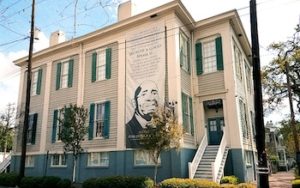
*The Beach Institute is celebrated on this date in 1867. This 19th-century school in Savannah, Georgia, educated newly freed Blacks.
Built by the Freedmen’s Bureau two years later and primarily funded by the American Missionary Association (AMA), it was named in honor of New Yorker Alfred S. Beach, Editor of Scientific American, who donated funds to purchase the site. Initially, 600 students enrolled. The school had nine female teachers and a male principal. Most of these teachers were white. Tuition was $1 per month in 1873. In 1874, The Beach Institute was turned over to the Savannah Board of Education and became a free public school for Black children.
In 1878, the school was damaged by fire, rendering it temporarily unusable. The AMA resumed control of the building and the educational programs as they were intent on securing a higher instruction grade than the Board of Education in Savannah thought it prudent to furnish. In 1917, the Savannah Boys Club rented one small room in the basement of The Beach Institute as its weekly meeting place. The activities and fame of this club extended and expanded until it occupied the entire basement of the building and utilized every weekday evening with its educational endeavors on behalf of underprivileged Black boys. The Beach Institute closed in 1919.
Enrollment had significantly declined due to the opening of Savannah’s first Black public high school on Cuyler Street and the prevailing popularity of the Georgia State Industrial College at Thunderbolt, which opened in 1891. Currently found at 502 E. Harris Street, the Beach Institute accommodates the offices of the King-Tisdell Cottage Foundation Inc. It is an African American cultural center featuring art exhibits and a unique collection of hand-carved wooden sculptures by folk artist Ulysses Davis and many other exhibits.